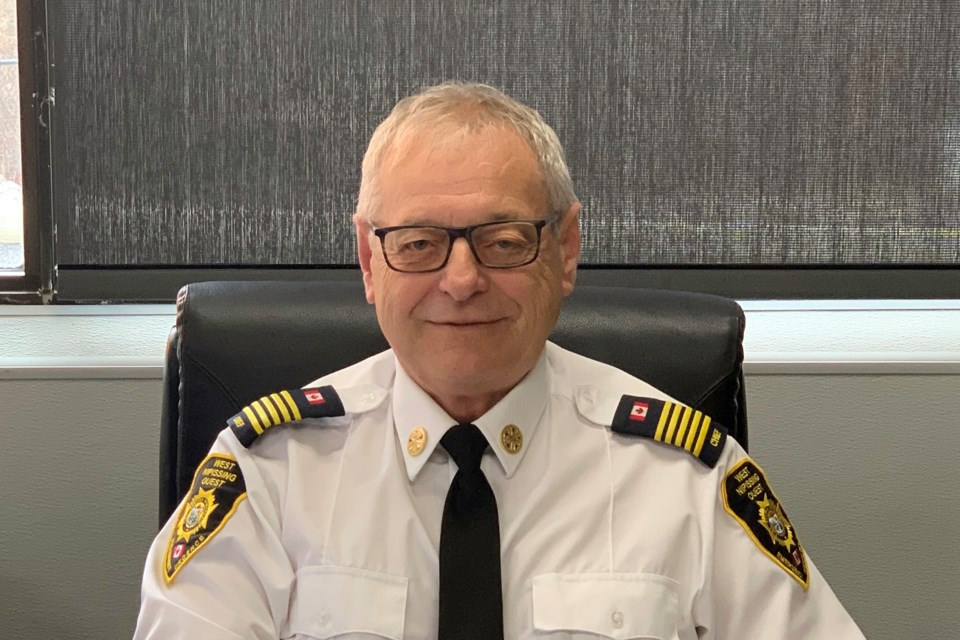West Nipissing’s fire chief Richard Maranda is calling it a day at the end of May, retiring from the department after 34 years of serving the community. Chief since 2013, Maranda looks forward to retirement, but admits he’ll miss life at the fire hall.
“The fire fighters and the crew you’re working with are like a second family,” he said. “And that will be the hardest thing to let go.” He’s made “so many friendships over the years, it’s unbelievable,” and the pending separation is the most difficult part of leaving. “It will be hard not to come to the station,” he said, “so I’ll definitely be bringing the coffee” by from time to time, he joked.
Maranda is staying in the community and is ready to help the incoming chief get adjusted if necessary. “The municipality always supported the fire department, so I’m going to help them out as much as I can” with the transition at the department’s top spot.
He’s lived in the area for most of his life, born and raised in West Nipissing, and “what kid doesn’t want to be a firefighter,” he wondered. He certainly did, and after training at the Ontario Fire College in Gravenhurst, he realized that dream by serving as a volunteer firefighter in Springer.
This is going back a bit, to 1976, and after working with the crew for a few years, he returned to Sturgeon Falls and in 1988 began volunteering for the department he would one day become Chief of.
Around this time, he was also looking after his family’s business, the Maranda Restaurant. The place no longer exists, but it once stood where the I.D.A. drugstore is now. “I still had it when I started to volunteer,” he recalled.
So began his 34-year journey with the department. In 1991, he became a spare fire fighter, and a training officer in 1999, when the great amalgamation took place, and the West Nipissing Professional Fire Fighters Association was born from the ashes of the Sturgeon Falls Professional Fire Fighters Association.
The chief has seen a lot throughout his career, including a lot of changes within the department, and the nature of fires in general. “The equipment is different, and building construction has drastically changed,” which alters the conditions fire fighters tackle. “Lots of synthetic materials” are used now, “and they burn a lot hotter,” than a solid wooden beam.
“The fire department has to evolve with what’s coming down the pipe,” he emphasized, noting the importance of continuous training and education for the fire fighters. He gave the example of “the new era coming” that will involve electric car batteries, solar panels, and storage batteries within homes. All of these items will pose new and unique challenges—“the dangers are changing somewhat”—and emergency workers will rise to the new challenges.
Of all the fires the Chief has helped put out, he cited Don’s Butcher’s Shop as one of the most intense he’s dealt with— “my biggest fire as Chief.” That fire shook Sturgeon Falls, with some witnesses describing 30-foot flames reaching into the sky. “Unfortunately, it’s an empty lot now,” he said, but “it was hectic” that day, and he had help from “just about every station,” and it still took about five hours to bring the fire under control.
See: UPDATED:Big fire in downtown Sturgeon Falls
His efforts for the town are always appreciated, and the Municipality thanked Maranda in a recent release “for this tireless dedication to protecting this community,” and wished him the “very best” in his upcoming retirement.
Jay Barbeau, the municipality’s chief administrative officer, emphasized how “Richard has been a valuable member of the senior management team,” and his “contribution to the organization will be missed.” Whoever comes in to replace him (the search is currently on) will “have very big shoes to fill.”
Once the reality of retirement kicks in, it may be difficult to get used to not having the ever-present pager with him, which “was never turned off, and you still get the adrenaline” flowing whenever it did.
Serving others and responding to calls for help is “my second nature,” the chief said. “We’re there to try to help people on their worst day,” he explained. “If you put yourself in their shoes, they are probably having the worst day of their lives, and we’re here to help.”
David Briggs is a Local Journalism Initiative reporter who works out of BayToday, a publication of Village Media. The Local Journalism Initiative is funded by the Government of Canada.
